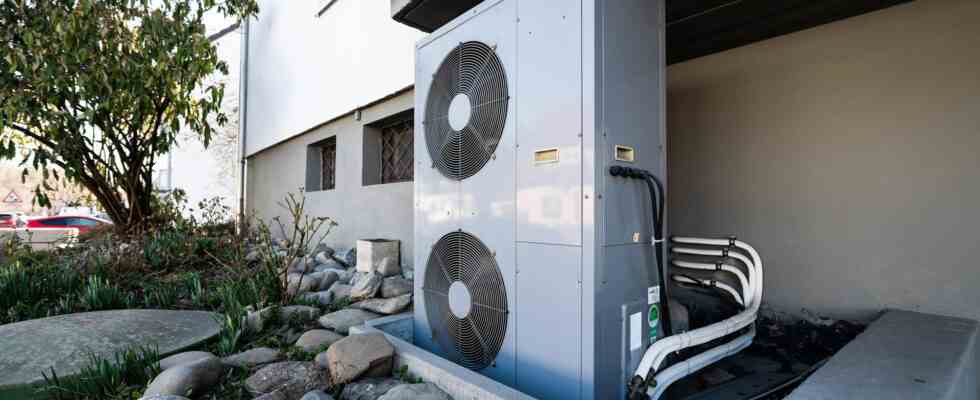FAQ
Status: 04/23/2022 5:42 p.m
Homeowners are struggling with high oil and gas prices. Many people think about installing a heat pump heating system. For whom is a change worthwhile – and what should be considered? Answers to important questions.
How high is the demand for heat pumps?
Interest in heat pumps has not only increased since Russia attacked Ukraine and the associated high oil and gas prices. 154,000 systems were installed last year, almost 30 percent more than in 2020. In the first quarter of this year alone, 35 percent more devices were sold than in the same period last year, said Katja Weinhold, press spokeswoman for the Federal Heat Pump Association tagesschau.de. In January, Economics Minister Robert Habeck increased the government target for heat pumps installed in Germany by 2030 from four to six million. This is another reason why Weinhold expects significantly higher sales for the current year.
Why is this technology so popular at the moment?
There are many reasons for the strong demand. Frank Ebisch, spokesman for the Central Association for Sanitary, Heating and Air Conditioning, attributes the current boom in demand for heat pumps to the great uncertainty of many homeowners, which is being triggered by rising energy costs. “People don’t know what to do. Many are afraid of rising costs.”
The discussion about the ban on purely fossil-fuelled heating systems, which is being led by politicians, is also increasing demand, explains Weinhold. The federal government announced in January that it wanted to massively increase the expansion of heat pumps in order to achieve the climate targets. A heat pump uses three quarters of the energy in the environment and converts it into heat. The most common heat sources are air, earth and groundwater. Heat pumps are therefore increasingly regarded as the heating technology of the future. “Switching to a climate-friendly heating system not only reduces your own CO2 footprint, but also increases the value of each property,” says Weinhold.
Who are heat pumps suitable for?
According to experts, the installation of heat pumps in new buildings is usually possible without any problems – but not always in old buildings. “In older, poorly insulated buildings that have not been renovated, relatively high flow temperatures are required to heat the rooms sufficiently,” says Ebisch. The energetic refurbishment of the building to create the conditions for a heat pump could take months. The investment costs should not be underestimated, says Ebisch. Individual advice is therefore all the more important.
Have prices gone up?
The high demand drives up the prices for heat pumps. The market observers from the energy consulting company Renewa have noticed a price increase of more than 50 percent in the past few months for material costs. “The costs for a heat pump in the single-family house sector are between 30,000 and 45,000 euros, depending on the type of operation,” says Tobias Labusga, senior energy consultant at Renewa. However, this is not only due to the increased production costs. “The industry is certainly also using the rush of consumers to cash in.” According to Labusga, the service costs of the craft businesses that install heat pumps have risen by around 25 percent in the past few weeks.
Does the conversion pay off – and how much is the subsidy?
In many cases, the installation of a heat pump could still be worthwhile. After all, the conversion to heat pumps is subsidized with government grants, according to association spokeswoman Weinhold. “Homeowners receive a subsidy of 35 percent on the total investment costs for exchanging an old fossil-fuel heating system for a heat pump. If the old heating system is oil-fired, even 45 percent of the costs are reimbursed.” If the installation of a heat pump is part of an individual renovation plan, an additional subsidy of five percent can be claimed.
“At the moment – in addition to the oil and gas prices – the prices for electricity that is required to operate the heat pump are also rising, but in the medium to long term it should be expected that fossil fuels will become more and more expensive due to the increasing price of CO2 emissions become,” says Weinhold. It is therefore economically attractive to heat with environmental energy and, if possible, renewable electricity.
How long does the installation take?
Due to the strong demand, homeowners currently have to be patient if they want to have a heat pump installed. According to Weinhold, waiting times of up to two years are realistic. According to the central association spokesman Ebisch, the craft is “completely busy”. “Less than 30 percent of companies even have the expertise to install a heat pump.” The global material shortages are a problem for the industry. “Some companies are currently unable to work because the industry cannot deliver. Important parts, such as electronics for the control system, are affected by supply chain disruptions.”
To make matters worse, there has been a lack of skilled workers for years, without whom neither the installation nor the maintenance of the heat pumps would be possible. “In order to be able to install the six million heat pumps targeted by politics, the industry alone needs 60,000 additional fitters,” explains Ebisch. At this point, politicians are asked to advertise more for further training. This is the only way to implement the rush and the political goal.

